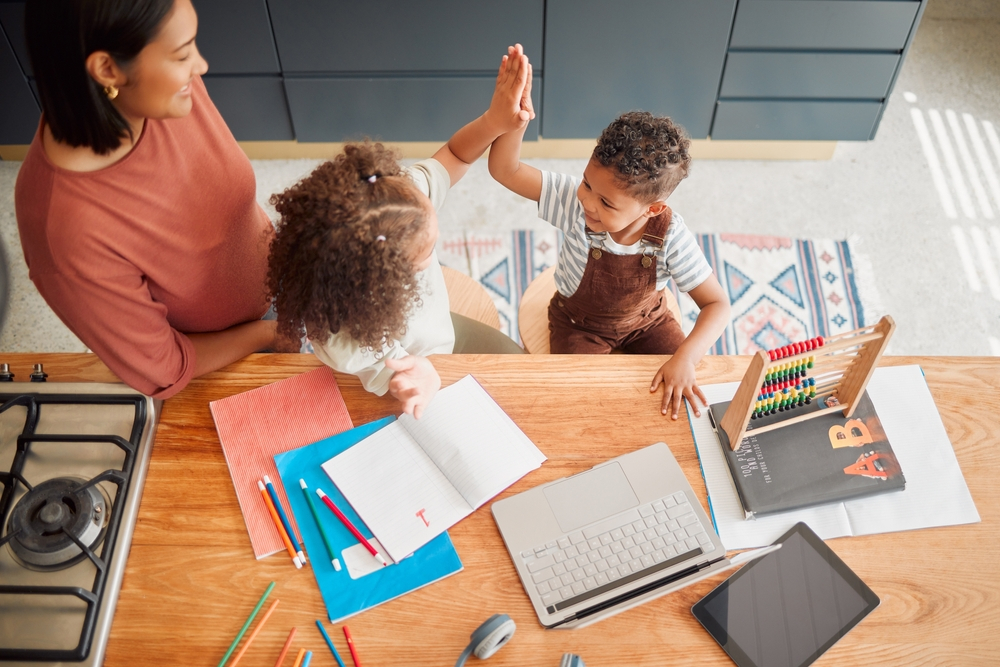
When it comes to Early Childhood Care and Development, you’re your child’s first teacher and understand them better than anyone else!
By talking to them, playing with them, and introducing simple skills, you can help set the scene for their future development.
So what do you need to know about early childhood development?
Early Childhood Care and Development (ECCD) Is a Big Deal!
As a parent, you know that your child’s early years are some of the most important because they are learning and growing at a rapid rate.
ECCD is the care and education of young children from birth to 8 years old including everything from playing with your child at home to sending them to preschool or daycare.
Research has shown that ECCD has a big impact on a child’s success in school and life. Kids who have access to high-quality ECCD programs are more likely to be ready for school, do well in school, and have successful careers.
There are many things that parents can do to help their children develop during the ECCD years. Let’s go through each tip.
Talking and Listening to Your Child:
The most rapid development of your child’s brain development takes place between birth and the age of two. Your child continues to learn and develop rapidly during the important early years of their life.
By building a few simple learning games into your child’s daily routines and helping them investigate their environment; you can help give them the best possible start to their education.
Whether in English or your home language you can help your child to learn by giving them opportunities to:
- Look at interesting things, in the garden or at home.
- Touch a variety of objects.
- Listen to a range of sounds like songs, rhymes, stories, and music.
- Taste a range of flavors.
- Investigate things that open, close, float, sink, twist, and turn.
- Explore objects like large boxes, things that make noises, and things that move.
- Play for uninterrupted periods, alone or with others, with help from adults, and in their own way.
- Talk to other children and adults.
Spending Quality Time Together:
Turning off the television or computer and spending time with your child creates valuable learning opportunities. Here are a few ideas about activities that your child can learn from:
- Pottering around the garden together teaches children about plant life, insects, and animals
- Simple kitchen tasks, like letting your child spread jam on sandwiches, can give an early lesson in making and improving motor skills.
- Playing games together teaches fair play and cooperative behavior.
- Family and holiday photos can give lessons in family history and geography.
Developing Personal and Social Skills:
One of the most crucial parts of early childhood care and development is helping your child develop personal and social skills to be able to deal with daily challenges, especially if he/she prepares to start school.
Few steps you can try with your child:
- Help your child to be independent with dressing and undressing.
- Encourage your child to use the toilet on their own.
- Praise your child when they tidy away their own toys.
- Talk to them about what they are doing to maintain interest levels and concentration.
- If your child finds they need help, make sure they know how to ask for what they need clearly.
- Talk about sharing and how important it is when they go to school.
- Can they play simple games that require them to take turns?
Developing mathematical skills for kids is important because it helps them to learn critical thinking, solve problems, understand the world, and prepare for their future, here’s why.
Developing Mathematical Skills:
Counting and noticing shapes come naturally in the early childhood development ECD, so you can use your child’s interest in these activities to help develop their mathematical understanding.
These skills can also be developed through stories, songs, games, and imaginative play. Even helping in everyday tasks like telling time or measuring ingredients for cooking, gives children the chance to learn new Maths skills.
Counting:
Your child may start to recognize numbers at an early age. They will go on to learn how to count and will use their skills with numbers to solve problems. To help develop your child’s counting skills, you could:
- Help your child count items around the home – tins in the cupboards, toys in the toy box, or pencils in the drawer, and set the table for dinner.
- Sing counting songs and rhymes like ‘Ten Green Bottles’.
- Have your child guess the next number as the oven timer counts down to zero.
- Point out numbers in everyday life: on the front door, birthday cards, car number plates, or clocks.
- Ask your child to collect a specified number of objects.
- Play games like ‘Snakes and Ladders that involve using dice.
Measuring:
Your child naturally learns to use words to compare the things they see for example, ‘bigger or smaller’, and ‘taller or shorter’.
They then learn about the tools needed for measuring things – scales for weight, tape measures for length, and clocks for time. To help develop your child’s measuring skills, you could:
- Practice measuring things at home with a tape measure and write down their sizes.
- Compare the lengths of two objects.
- Compare objects to see which is heavier.
- Fill and empty containers.
- Weigh ingredients for cooking.
Learning about Shapes:
As developing mathematical skills, after learning about the names of shapes, your child’s next phase of learning is to describe and differentiate between shapes and what they are like. Therefore you can encourage your child’s interest in shapes by:
- Comparing the shapes of the street signs on the way to the shop/school.
- Looking at everyday objects and finding words to describe their shape.
- Getting them to find everyday objects which are squares, circles, triangles, and rectangles.
Also, the process of early childhood care and development includes reading and writing skills that help children learn how to use language in different ways, such as storytelling, describing, and explaining.
Developing Reading Skills:
Our children are in exploring the world phase, exposed to new things, and without the ability to use simple vocabulary to express their feeling and their needs, they miss a lot!
Here’s how to help them develop reading skills and make sure to check our blog about Early Years Foundation Stage.
Reading together:
Everywhere you go with your child you have a chance to read together. Whether it’s on the bus, driving in the car, in shops, or at the post office, you can point out the words around you and that’s the beginning of reading.
Reading stories with your child, even if for just 10 minutes a day, will help to build important skills, as well as capture your child’s interest in books and there are fun ways to develop their writing skills too. From their earliest days, babies enjoy listening to stories and looking at books.
Develop this interest by having a cozy reading time each day… To make a fun and effective reading routine for your child:
- Spend 10 minutes a day reading together, and make it fun by choosing books you both enjoy.
- Talk about the pictures and characters in the books and make up your own stories.
- Buy books as presents and join a local library.
- Try playing ‘I Spy’ and say the first letter sound of an object that you see around you – get your child to guess the object.
- Learning about Lea.
Learning about letters:
Children often learn to read by matching letters with the sounds they remember hearing. To help this learning process you can try to:
- Teach your child to spot letters they recognize (like the first letter of their name).
- Get your child to spot letters they recognize in words.
- Sing nursery rhymes and songs together while pointing to the words in a book.
- Look at brochures and catalogs together, and point out words printed in bold or with unusual fonts.
- Play ‘I – spy’ to show the sounds and letters that different words begin with.
- Play games with sounds, making up silly words that all begin with the same sound (like the first sound in their name).
Developing Mark–Making and Early Writing Skills:
From a young age, children enjoy experimenting with making marks and doing their own ‘writing’ which they will enjoy ‘reading’ to you. You can also help your child by:
- Helping them to make marks on paper with a range of tools such as their fingers, brushes, and crayons.
- Taking part in other activities that enable them to develop their motor skills, such as rolling dough, cutting paper, or threading laces.
- Helping them ‘write’ labels, birthday cards, and invitations.
Conclusion:
As you can see, early childhood care and development is crucial for your child’s physical and mental development as well as school readiness and success. By providing a nurturing care, stimulating, and supportive environment for your child, you can help them develop the skills, knowledge, and confidence they need to thrive in school and beyond.
Remember, you are your child’s first and most important teacher, and you have the power to make a positive difference in their future!
